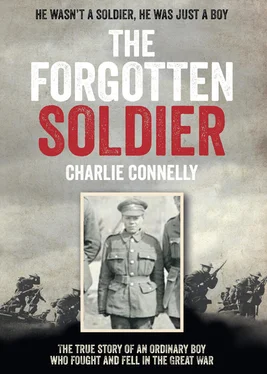Soldiers had been a common sight in the streets of Dover since before the Napoleonic Wars, and they were equally visible during the first decade of the twentieth century. One hot day George was drinking from a horse trough on the Folkestone Road when a horse galloped up and arrived next to him.
‘I saw a bundle of khaki on the ground hanging from a stirrup,’ George recalled. ‘It was a soldier who had been thrown from his horse and dragged about a mile.’
It wasn’t all hapless horsemen and innocent mischief, though. On his way home from the cliffs one day George came across the body of a soldier with his throat cut. The boys raised the alarm, but not before George secured himself a souvenir.
‘I took his hat,’ said George. ‘He was in the Buffs [the Royal East Kent Regiment] and I played soldiers with it. My brother Walter told my dad I’d pinched the soldier’s hat but all he said was, “Well, he won’t be needing it any more.”’
Things changed for George a year or so before war broke out when his father was badly injured at work. Going to school one day he’d seen George senior on a tram and, given the time of day and the fact that his father was proud of how he walked everywhere, he knew immediately something was wrong.
‘He was sitting, leaning forward,’ George recalled. ‘He’d had an accident and broken some ribs. There were always accidents and people killed at the harbour. It was dangerous work. He never went back to work at the harbour and I don’t think he got a penny from them.’
George was sent to live with his grandmother while his father recovered. When George senior was well enough he found a job at the local convent repairing boots for fifteen shillings a week. Meanwhile, having been rejected by the navy because his chest measured an inch below the minimum, Walter, whom George looked up to like a hero, joined the army.
Times were hard for the Fortunes and George left school at fourteen for a job as a lather boy at a local barber’s shop. For his 3/6 a week George worked from 8 a.m. to 8 p.m., Monday to Friday, and then 8 a.m. to midnight on Saturdays. As well as the lathering, he had to clean the windows, sweep up the hair, clean the copper urns in which the barber heated the water and he even had to clean the boots of the barber’s entire family. He was harshly treated, certainly in today’s terms, but this elicited little sympathy from the elder Fortune: ‘The barber was a little man, about five feet tall, half German, and he was horrible to me. I told Dad about him swearing at me and he said, “It will do you good; you need someone to wake you up.”’
When the war came in August 1914, the talk among the young men of Dover was all of joining up and fighting the Hun. Fuelled by boyish bravado the talk might have been, but George’s friends soon began disappearing to training camps and then to the Front. Still only fifteen years old, George tried to enlist: ‘All the lads were joining up so I tried and said I was nineteen. I was a big boy but I failed the doctor, who said I had a hernia.’
The army doctor referred him to the local hospital for an operation to the remove the hernia, but when he arrived George found the place overrun with wounded men from the Front brought home by ship from Dunkirk. Reluctant to go under the knife, the youngster instead set about making himself useful.
‘The hospital was full and I helped the nurses,’ recalled George. ‘I was in there three weeks and they forgot who I was: I was like a hospital orderly. I had a fine old lark with the wounded men. I used to jump right over their beds for a bit of fun. Then one day the house surgeon was walking round. He saw me and said, “What’s this fellow doing here?” I told him and he said, “Right, we’ll have him on the table.”’
After the operation George was flat out for ten days, in constant pain. No one visited him except a priest, and when he was well enough to leave he had to walk the mile and a half home. Soon afterwards his sister Cecilia, aware of the fractured nature of the Fortune family in Dover since their father’s accident and mother’s departure, took him to London while he recuperated from the operation and found him work with her plumber husband in West Hampstead.
‘Ciss was a godsend to me,’ he remembered. ‘I was ill and she brought me back to health. Then I went to work as a plumber’s mate and I loved the work.’
This fledgling apprenticeship was brought to an end all too soon, however, when George’s brother-in-law joined up and went off to war. George moved on to Highgate to live with his mother and found a job on the Underground. Once settled he wrote to his father but never received a reply – he found out later that his father had emigrated to Australia, taking one of his younger brothers with him. George never saw either of them again.
By 1916 George was working as a gateman at Hammersmith Underground station and living with another older sister, Gladys, whose husband was also away at the Front. Feeling a little like an imposition as Gladys brought up two children in cramped conditions, George decided it was time to try to enlist again and attended the recruiting office at White City: ‘The doctor hardly looked at me this time and I was passed A1. I told the railway and they said they couldn’t keep the job open for me. I didn’t worry much as I was going to be a soldier.’
William Dann, also born in 1899, a couple of months later than Edward, lived along the coast from George in Brighton and would go on to join the same battalion as Edward, the 10th Queen’s (Royal West Surrey). Descended from a long line of Sussex agricultural labourers, William bucked the family trend when he left school at fourteen to be apprentice to a painter named Fisher, who employed him to assist in the painting of brewery vans in red, black and gold-leaf livery. It wasn’t long before the war impacted on William, too.
‘He was a very nice man indeed,’ recalled Dann of Fisher. ‘But as a reservist in the Royal Marines he was called up almost immediately, and we heard he was killed about three months later.’
Like George, all the talk around him was of the war. The army had sergeants walking around Brighton stopping men apparently of military age and asking them pointedly why they hadn’t joined up. One day in 1916 one of them stopped William and, despite being barely seventeen, he decided to go and enlist.
‘I was at lunch on this particular day and thought, I suppose I’d better go and join the army, then,’ he remembered. ‘So I went to the drill hall in Church Street in Brighton, queued up past the sergeant and the policeman on the door and eventually came around to the officers and the sergeant at the recruiting desk. They said, “How old are you?” I said, “Seventeen.” “Ooh, no,” they said, “that won’t do; come back when you’re nineteen.” As I was going out, the sergeant on the door said, “What? You back already?” I said, “It’s no good. They won’t take me.” He asked why and I said, “I told them my age, seventeen.” He looked from side to side, lowered his voice and said, “Well, go and join the queue again and when you get to the front again just say you’re nineteen.” So that’s what I did. Next thing I was sent along to the barracks in Lewes Road for a fitness examination. I came out with an A1 and I was in the army.’
In West Yorkshire, Horace Calvert was another young working-class boy like Edward trying to make his way in the world. Horace was born in September 1899 in Manningham, Bradford, to a father who worked as an assistant to Horace’s grandfather at an ironmongery business on Carlisle Road. Horace was one of six children, four girls and two boys.
‘It was just the usual everyday life of that time,’ said Horace of his childhood. ‘I started going out delivering papers and running errands at the age of nine or ten, anything to get some extra money because there were eight of us in the family and money was tight.’
Читать дальше












